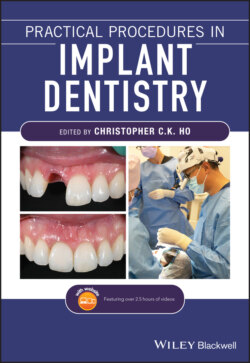Читать книгу Practical Procedures in Implant Dentistry - Группа авторов - Страница 22
2.1.6 Osteoporosis and Bisphosphonate Therapy
ОглавлениеOsteoporosis has been defined as a decrease in bone mass and bone density with an increased risk and/or incidence of fracture. Currently there is no evidence to suggest that clinical diagnosis of osteoporosis affects all parts of the skeleton uniformly. Thus, a diagnosis of osteoporosis in other parts of the skeleton does not presume that the maxilla and mandible are affected. A systematic review [10] reports no evidence for a higher failure rate of dental implants in the osteoporotic patient.
The mode of action of bisphosphonate and other osteoporosis‐related medications is to disrupt osteoclastic‐mediated bone resorption, and this may reduce bone deposition by osteoblasts with a reduction in bone resorption and bone turnover.
Medication‐related osteonecrosis of the jaw is a potential complication with long‐term use of bisphosphonates and complex surgeries. The impaired bone healing may leave exposed bone uncovered by mucosa resulting in chronic pain, infection, bone loss, and possible pathologic jaw fracture. The risk is increased in IV infusion therapy of these medications, other comorbidities, duration of medication usage, and the complexity of surgery.
In a postal survey, Mavrokokki et al. [11] estimated the risk of osteonecrosis of the jaw after dental extraction to be 0.09–0.34% with weekly oral alendronate (Fosamax) and 6.7–9.1% with IV formulations used for bone malignancy.
The American Association of Oral and Maxillofacial Surgeons updated position paper (2014) on bisphosphonate‐related osteonecrosis of the jaws listed additional risk factors of corticosteroid use, diabetes, smoking, poor oral hygiene, and chemotherapy [12]. Their recommendations are as follows:For individuals on oral bisphosphonate for less than four years with no clinical risk factors, no alteration or delay in the planned surgery is necessary. It is suggested that if dental implants are placed, informed consent should be provided related to possible long‐term implant failure and the low risk of developing osteonecrosis of the jaws if the patient continues to take an antiresorptive agent.For those patients who have taken an oral bisphosphonate for less than four years and have also taken corticosteroids or anti‐angiogenic medications concomitantly, the prescribing provider should be contacted to consider discontinuation of the oral bisphosphonate (drug holiday) for at least two months prior to oral surgery, if systemic conditions permit. The antiresorptive should not be restarted until osseous healing has occurred.For those patients who have taken an oral bisphosphonate for more than four years with or without any concomitant medical therapy, the prescribing provider should be contacted to consider discontinuation of the antiresorptive for two months prior to oral surgery, if systemic conditions permit. The bisphosphonate should not be restarted until osseous healing has occurred.
Current management is based on minimal evidence and expert opinion with an emphasis on prevention. Informed consent must be attained on possible risks and complications. Ongoing careful monitoring is essential when considering implant treatment for these patients.
